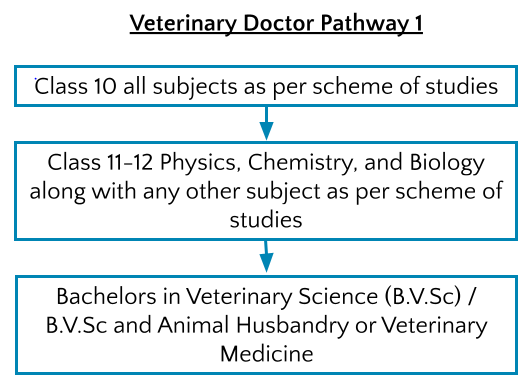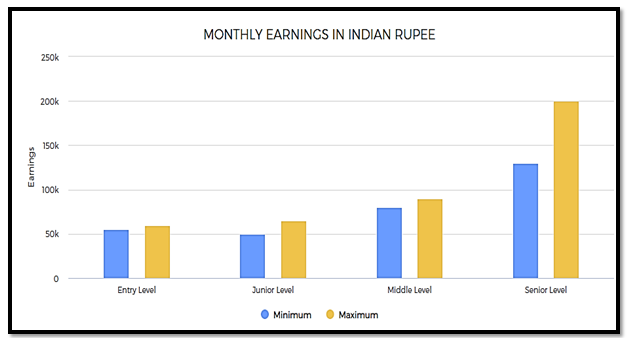Veterinary Doctor
Entry Level Qualification
Graduate
Career Fields
Medical Services
For Specially Abled







Career Entrance Exam
About Career
1. Veterinarians are doctors for animals. As a veterinarian, you can work for the healthcare of different types of animals. You will evaluate, diagnose and treat any medical conditions from which animals suffer. These animals could be domestic pets, animals that participate in sports like horses, and even wild animals. You will treat and dress their wounds, perform surgeries, vaccinate animals and also educate their owners/caretakers about general care and medical conditions.
2. You can also choose to become a doctor for specific types of species or animals such as exotic animals, marine animals or livestock/farm animals. You can opt to specialise based on a field such as anesthesiology, clinical pathology, veterinary dermatology and even veterinary microbiology.
3. Another way to specialise is by species such as canine specialists (domestic dogs, wolves, foxes, etc.), avians specialists (birds), equine specialists (horses, donkeys, zebras, etc.), and even feline specialists (cats, leopards, tigers, etc.).
PARTICULARS | DESCRIPTION |
Name | Veterinary Doctor |
Purpose | Regular Medical And Physical Checkups |
Career Field | Allied & Para Medical Science |
Required Entrance Exam | NEET UG, NEET PG |
Average Salary | 600000 -1000000 Rs. Per Year |
Companies For You | Animal processing facilities, Colleges and universities & Many More |
Who is Eligible | Graduate |
Key Roles And Responsibilities
If you choose the career of a veterinary doctor, the following will be some of your roles and responsibilities:
1. Doing regular medical and physical checkups to monitor the animal’s health. Checkups and examinations can either be done at the animal farm or your clinic.
2. Detecting the illness or condition of the animal by conducting tests and examinations. You must create treatment plans as per the specific case. A treatment plan must consider factors such as the living conditions of the animal, its breed and age, food intake, hygiene and other such factors. Animals could suffer from various illnesses such as skin diseases, food indigestion, infection or other communicable diseases.
3. Performing surgeries and emergency care for the animal whenever needed.
4. Educating and informing the pet/animal owner about the best practices to care for their animal: This could include tips on how to administer prescribed medicines, how to study animal behaviour and monitor for signs for diseases and maintain a healthy and clean environment.
5. Suggesting or offering to euthanize (the painless killing of an animal that is suffering) the animal when it is the best course of action: This is one of the hardest parts of this job, but you must suggest and handle this process when medication fails to work, or the animal is in too much pain.
6. Conducting an autopsy on an animal to determine the specific disease: This is usually done if the disease is serious and might put other animals at risk.
7. Keeping logs, medical reports and forms of each patient and expanding your knowledge by reading new publications and keeping yourself updated with the latest medical techniques and treatments.
8. Notifying the public health department if any disease is detected that can be passed on to other animals as well as humans. You can provide biological samples and data to prove your suspicion.
9. Adhering to the code of ethics of being a veterinary doctor: This includes operating with a license, ensuring professional behavior, ethical treatment of animals and client privacy. In case a client switches to another doctor, you must also transfer all the treatment records to ensure a smooth transition for the client.
Career Entry Pathway
Class 10 all subjects as per scheme of studies – Class 11-12 Physics, Chemistry, and Biology along with any other subject as per scheme of studies - Bachelors in Veterinary Science (B.V.Sc) / B.V.Sc and Animal Husbandry or Veterinary Medicine.
After completing Class 10 all subjects as per scheme of studies pursue Class 11-12 Physics, Chemistry, and Biology along with any other subject as per scheme of studies. Following this, you can get a Bachelor’s degree in Veterinary Science (B.V.Sc) / B.V.Sc and Animal Husbandry or Veterinary Medicine.
Class 10 all subjects as per scheme of studies – Class 11-12 Physics, Chemistry, and Biology along with any other subject as per scheme of studies - Bachelors in Veterinary Science (B.V.Sc) / B.V.Sc and Animal Husbandry - M.V.Sc or Master’s degree in Veterinary Medicine in a specialised area.
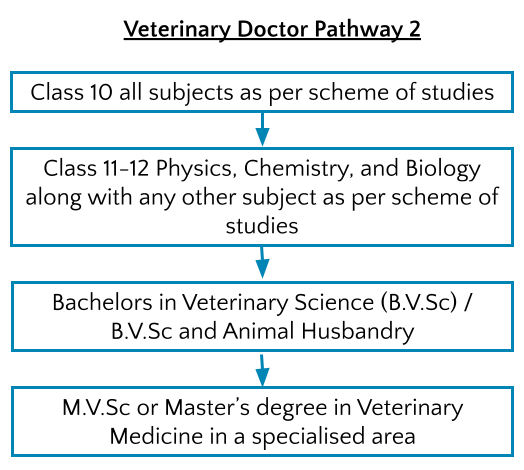
After completing Class 10 all subjects as per scheme of studies and after Class 11-12 Physics, Chemistry, and Biology along with any other subject as per scheme of studies, you can get a Bachelor’s degree in Veterinary Science (B.V.Sc) / B.V.Sc and Animal Husbandry. You can further study for M.V.Sc or Master’s degree in Veterinary Medicine in a specialised area such as animal behaviour, animal welfare, veterinary cardiology, veterinary immunology, animal nutrition, veterinary oncology and veterinary parasitology.
Required Qualification & Competencies
To be a Veterinary Doctor, you must do a Bachelor degree in Veterinary Science and Animal Husbandry / Veterinary Medicine. After your Bachelor’s degree, you may also specialize by doing a Master’s degree in any of the following fields:
1. Biostatistics (Veterinary Science)
2. Livestock Economics
3. Livestock Production & Management (Veterinary Medicine)
4. Livestock Products Technology (Veterinary Medicine)
5. Other Veterinary Sciences
6. Veterinary & Animal Husbandry Extension Education
7. Veterinary Anatomy & Histology
8. Veterinary Bacteriology
9. Veterinary Biochemistry
10. Veterinary Clinical Complex
11. Veterinary Clinical Medicine
12. Veterinary Epidemiology & Preventive Medicine
13. Veterinary Extension Education
14. Veterinary Gynaecology & Obstetrics
15. Veterinary Immunology
16. Veterinary Medicine Practice
17. Veterinary Medicine, Ethics & Jurisprudence
18. Veterinary Microbiology
19. Veterinary Nursing
20. Veterinary Parasitology
21. Veterinary Pathology
22. Veterinary Pharmacology & Toxicology
23. Veterinary Physiology
24. Veterinary Preventive Medicine
25. Veterinary Public Health
26. Veterinary Sciences & Animal Husbandry
27. Veterinary Surgery & Radiology
28. Veterinary Virology
MINIMUM EDUCATION REQUIRED | MAXIMUM EDUCATION REQUIRED |
Under Graduate Undergraduate Degree / Honours Diploma / Graduate Diploma (equivalent to a Degree) Programs for which the minimum eligibility is a pass in Higher Secondary / Class XII School Leaving examination. | Post Graduate Postgraduate Degree / Diploma / Certificate Programs for which the minimum eligibility is a pass in Graduation / equivalent Diploma program like Honours Diploma or Graduate Diploma. |
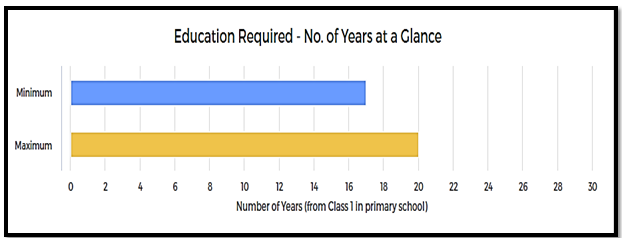
Competencies Reqiured
Interests
1. Investigative: You should have interests for Investigative Occupations. Investigative occupations involve working with ideas and quite a lot of thinking, often abstract or conceptual thinking. These involve learning about facts and figures; involve use of data analysis, assessment of situations, decision making and problem solving.
2. Realistic: You should have interests for Realistic Occupations. Realistic occupations involve more practical and hands-on activities than paperwork or office work. Realistic occupations often involve physical activities for getting things done using various tools and equipment.
Abilities
1. Abstract Reasoning: The ability to understand ideas which are not expressed in words or numbers; the ability to understand concepts which are not clearly expressed verbally or otherwise.
2. Deductive Reasoning: The ability to apply general rules and common logic to specific problems to produce answers that are logical and make sense. For example, understanding the reasons behind an event or a situation using general rules and common logic.
3. Manual Dexterity: The ability to quickly move your hand, your hand together with your arm, or your two hands to grasp, manipulate, or assemble objects.
4. Naturalistic Intelligence: The ability to recognise different flora and fauna of the world; sensitivity towards nature and natural surrounding; sensitivity towards the needs of different flora and fauna.
5. Problem Sensitivity: The ability to tell when something is wrong or is likely to go wrong. It does not involve solving the problem, only recognizing there is a problem.
6. Selective Attention: The ability to concentrate on a task over a long period of time without being distracted.
7. Verbal Reasoning: The ability to think and reason with words; the ability to reason out ideas expressed in words.
8. Written Comprehension: The ability to read and understand information and ideas presented in writing.
9. Written Expression: The ability to communicate information and ideas in writing so others will understand.
Knowledge
1. Animal Care: Knowledge about how to take care of animals and cater to different needs for both domestic and farm animals. This includes knowledge about animal breeding, raring, raising, basic healthcare and grooming,
2. Animal Healthcare: Knowledge about how to diagnose, treat and prevent animal diseases, ailments and disorders. This includes knowledge about the various methods and procedures for assisting Veterinary Doctors as well as the knowledge about how to provide primary healthcare to domestic and farm animals.
3. Biological Sciences: Knowledge of plants and animals, their anatomical structure, cell structure, tissues, physiological functions, evolution, and all other related aspects.
Skills
1. Active Learning: Focused and continuous learning from various sources of information, observation and otherwise for application in getting work done.
2. Critical Thinking: Skills in analysis of complex situations, using of logic and reasoning to understand the situations and take appropriate actions or make interpretations and inferences.
3. Judgment and Decision Making: Skills in considering pros and cons of various decision alternatives; considering costs and benefits; taking appropriate and suitable decisions.
4. Problem Solving: Skills in analysis and understanding of problems, evaluating various options to solve the problems and using the best option to solve the problems.
5. Reading Comprehension: Skills in understanding written sentences and paragraphs in work related documents.
6. Scientific: Skills in using various scientific rules and methods to get things done or solve problems.
Personality
1. You are always or mostly a soft-hearted person.
2. You are always or mostly helpful to others.
3. You are always or mostly caring, supportive, sympathetic and kind to others.
4. You are somewhat organised in your day-to-day life and activities.
5. You prefer to experience new things and have new experiences sometimes.
6. You act independently sometimes but do not do so in some other times.
Career - Job Opportunities & Profiles
1. After a Bachelor’s degree in Veterinary Science and Animal Husbandry/Veterinary Medicine, you can get a job as an Assistant Veterinarian Medical Officer.
2. After a Master’s degree in Veterinary Science and Animal Husbandry/Veterinary Medicine, you can get a job as a Medical Officer (Veterinary) in Veterinary Medicine or Surgery department.
3. After a Master’s degree in Veterinary Science and Animal Husbandry/Veterinary Medicine, you may also get a job as a Tutor in a Veterinary college.
Work Environment
1. The line you choose to specialize in determines your workplace. As a veterinarian, you could be working for the government, a private industry clinic or laboratory, or be self-employed.
2. Although most doctors work at hospitals and clinics, those who treat horses and food animals must pay visits to farm ranches and sheds to do a checkup. Veterinary doctors working in food safety and inspection will have to visit food-processing plants and slaughterhouses to conduct their business.
Some other workplaces of veterinary doctors include:
1. Animal shelters
2. Animal processing facilities
3. Colleges and universities
4. Zoos and aquariums
This line of work can be physically and emotionally demanding since one will be dealing with ailing animals with anxious owners. The physical challenge comes in long treatment hours and when dealing with large animals. Working hours can be long, and you may even have to come in on non-working days in case of emergencies.
Specialisation Tracks in This Career
1. Veterinary Pathology
Veterinary pathology is an area of medicine which diagnoses diseases and conditions by examining body tissue and fluids. Through the findings, you can understand the animal’s health condition better and determine how to care for it. As a pathologist, you must be level-headed since you may not always be dealing with living animals. Sometimes, you will be collecting and evaluating specimens from dead animals as well.
2. Animal Nutrition
As an animal nutritionist, you will be in charge or charting down what are the nutrition requirements for the animal and which are the best foods to feed it. To calculate the animal’s nutritional and caloric requirements, you will use a method called body condition scoring to account for its physical activities such as reproduction and lactation and check if any nutrients are missing from its diet from before.
3. Veterinary Dentistry
A veterinary dentist takes care of oral hygiene for animals. Ensuring the animal has strong jaws and teeth not only enables it to chew, but it can also prevent the risk of any brain conditions that are caused by infection. As a veterinary dentist, you can also specialize in streams such as Endodontics, Oral and maxillofacial surgery, Prosthodontics and Orthodontics.
4. Veterinary Radiology
A veterinary radiologist’s duty is to create images to locate where the animal’s illness or injury is and use the scans as a source to create treatment plans. These images or scans of the animal are X-Rays, CT scans, MRI scans, Ultrasounds and Radiographs. Radiologists also write detailed reports and use various software applications to interpret the images. Radiologists also use Teleradiology to transmit images online to deal with cases across the world.
5. Veterinary Dermatology
A veterinary dermatologist is an expert in the treatment of animal skin for parasitic infection, hair loss, skin cancer and any other type of skin allergies. As a dermatologist, you can also diversify your career options by getting involved with teaching, publishing research material and manufacturing animal healthcare products.
6. Veterinary Cardiology
Veterinary cardiologists focus on detecting and treating illnesses related to the heart and circulatory system such as coughing and breathing problems, congestive heart failure, high blood pressure and heart muscle diseases. Some methods of diagnosis include sonograms, radiography, implanting pacemakers for regulating heart rates and doing a blood pressure evaluation.
7.Veterinary Neurology
As a veterinary neurologist, your primary focus areas of animals will be the brain, spinal cord, nerves and muscles. Animals can suffer from various neurological illnesses such as paralysis, seizures, balance issues and spinal pain, and since animals cannot voice their concerns, it is up to you as a neurologist to determine which parts have been affected due to the illness and identify the exact cause of it.
Career Growth
A veterinary team consists of doctors with all sorts of different job titles:
1. You can work as a Veterinary Technician if you have just obtained your bachelor’s degree. There are many roles for a fresher on an Assistant level such as a technician, a veterinary medical officer or an assistant researcher.
2. Once you gain a few years of experience, you can work as a technician, veterinary medical officer or a researcher on a mid-level payroll. If you choose to specialise and study further, you can get a higher paying job of a veterinary technician specialist.
3. After spending a few more years in this field, you can get promoted to a senior level while working as a technician, medical researcher or a medical officer.
4. If you no longer want to work in a private or government hospital or a laboratory, you can set up a private practice of your own once you have all the experience and recognition you need.
Salary Offered
1. When you start as a fresher, you can get a job as an Assistant Medical Officer (Veterinary) and earn about Rs. 55,000 - 60,000 a month.
2. In a mid-level job as a Medical Officer (Veterinary), you can earn a salary of Rs. 80,000 - 90,000 a month.
3. On a higher level as a Senior Medical Officer or a senior consultant, you can get a salary of Rs. 1,30,000 - 2,00,000 a month.
4. Those in private practice may expect to get about Rs. 200 - 500 per call.
5. For surgeries, the rate may vary between Rs. 2,000 - 50,000 or even more depending on the complexity of the case.
Monthly Earning In Indian Rupee
Entry Level | Junior Level | Mid-Level | Senior Level | |||||
Min Earning | Max Earning | Min Earning | Max Earning | Min Earning | Max Earning | Min Earning | Max Earning | |
55000 | 60000 | 50000 | 65000 | 80000 | 90000 | 130000 | 200000 | |
1. Entry level: 0 - 2 years of work experience
2. Junior Level: From 1 to 12 years of work experience
3. Mid-Level: From 5 to 20+ years of work experience
4. Senior Level: From 10 to 25+ years of work experience (there could be exceptions in some high-end technical, financial, engineering, creative, management, sports, and other careers; also in the near future, people will reach these levels much faster in many careers and in some careers, these levels will have no meaning as those careers will be completely tech skill driven such as even now, there is almost no level in a Cyber Security Expert’s job)
Work Activities
1. Assisting and caring for animals: Taking care of animals in different situations and settings.
2. Communicating with co-workers and others: Communicating with people in writing, verbally or otherwise inside your workplace and various other people who have professional relationships with your place of work including vendors, government officials, etc. or with people at large.
3. Decision-making and problem-solving: Analysis of data and information; evaluation of alternative decisions and results of decisions; taking the right decisions and solving problems.
4. Getting Information and learning: Observing, hearing, reading, using computers, or otherwise obtaining information and learning from it.
5. Inspecting situations, events, and people: Inspecting situations, events and people to understand the reasons and causes for the situation or events to happen; inspecting people to understand reasons behind their behaviour and actions.
6. Organising, planning and prioritising tasks: Planning and organising tasks in order to achieve work goals; prioritising tasks to achieve goals and making the best use of the time available.
7. Providing advice and consultation to others: Giving advice or consultation to others about various issues, conceptual matters, know-how, scientific matters, products or services.
8. Updating and using relevant knowledge: Keeping updated with the latest knowledge relevant to your fields of work and use of the relevant knowledge in getting things done.
9. Working in a team: Working in a team of people; developing team; maintaining professional relationships among team members.
Future Prospects
1. Animal husbandry is an integral part of the Indian economy alongside agriculture, and occupies the top spot in milk production, as well as has the largest livestock population of around 512 million.
2. All this is indicative of the immense opportunities that lie in the veterinary sector of the country and related services such as animal healthcare, veterinary polytechnics & dispensaries.
3. While it can be said that India faces a lack of penetration of modern veterinary care in the market, the industry's growth journey can only be upward. This is because of growing industries such as dairy, poultry, piggery & other related sectors, and the emergence of the pet-loving urban class.
4. The India Veterinary Healthcare market is expected to register a CAGR of around 10% and the vaccine segment is expected to lead the Indian market.
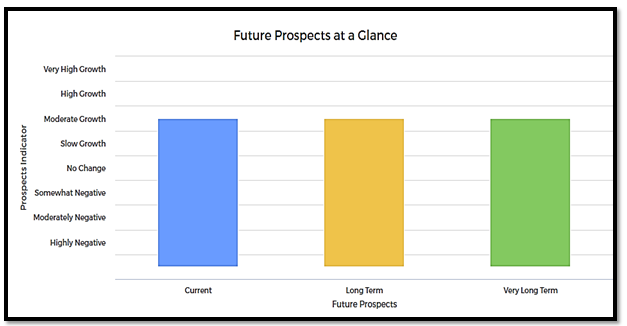
Future Prospects At A Glance
Current (0-1 year) | Long Term (2-5 year) | Very Long Term (6-10 years) |
Moderate Growth | Moderate Growth | Moderate Growth |

